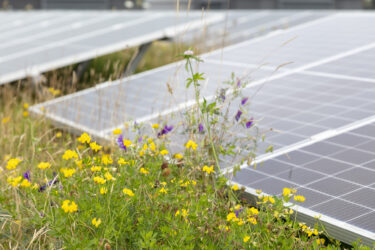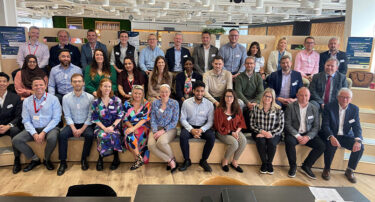The built environment sector is responsible for 25% of UK greenhouse gas emissions.
As a major organisation in our sector, we have a responsibility to be more sustainable, and are committed to being a net zero carbon company by 2045.
We’re working to eliminate carbon and waste from our operations and to improving the natural environment. We’re doing all we can to create a cleaner, greener, and safer world for future generations.
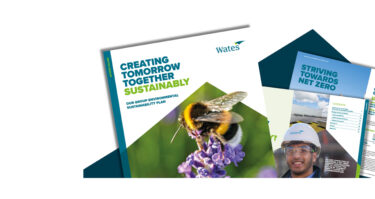
OUR ENVIRONMENTAL SUSTAINABILITY PLAN
We’re committed to being a net zero carbon operator, and our environmental sustainability plan sets out how we plan to achieve this.
It’s an evolution of the environmental ambitions we set out in 2020, and is designed to help us galvanise around our short-term targets. This ensures we can make real, measurable progress whilst having an eye on key long-term targets that we also need to achieve.

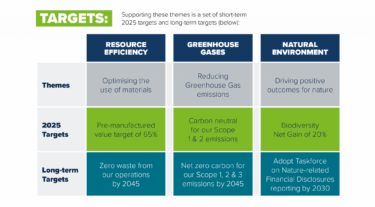
Strategic themes and targets
We are committed to net zero and zero waste in all our operations by 2045. This means:
- Optimising the use of materials and avoiding waste through resource efficiency.
- Reducing our Greenhouse Gas (GHG) emissions in all products and processes.
- Driving positive outcomes for the natural environment.
These are the three strategic themes of our Environmental Sustainability Plan. The plan sets out short- and long-term sustainability targets, in line with the UN Sustainable Development Goals.
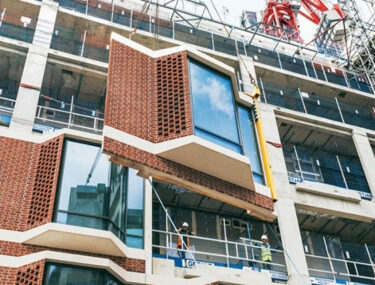
Resource Efficiency
The UK urgently needs new housing stock and infrastructure. At the same time, we need to reduce consumption of natural resources and protect our environment from further harm. That means limiting the resources we use, managing materials carefully, adopting a circular economy approach and minimising waste.
We recycle and divert over 99% of the waste we produce, on track for zero waste by 2045. We encourage retrofit over demolition and rebuild and employ Modern Methods of Construction (MMC) to optimise material use and reduce waste. We have set a pre-manufactured value (PMV) target of 65% for our businesses where we can influence MMC. We also work closely with our supply chain to reduce material use and eliminate waste.
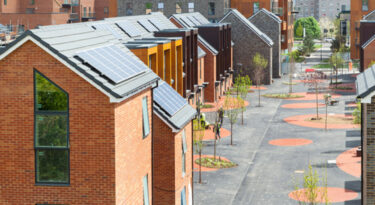
Greenhouse gases
Greenhouse Gas (GHG) emissions are a key cause of climate change. Our aim is to be carbon neutral for our direct (Scope 1) and indirect (Scope 2) emissions by 31 December 2025. We also have a near-term target for our supply chain (Scope 3) emissions, as we progress towards net zero.
Through our Zero Carbon Sites programme we’re reducing our dependence on diesel, cutting energy demand, and using the most efficient generator set-ups, and favouring battery systems. We will transition fully to electric or green hydrogen powered plant once available. We also aim to eliminate diesel and on-site generation for welfare and equipment to minimise pollution and air quality risk.
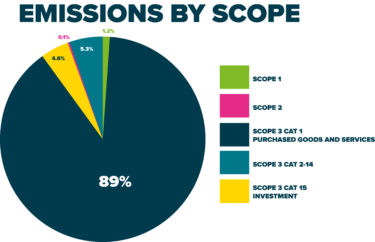
Purchased goods and services account for more than 89% of our emissions.
To meet our net zero target, we will focus first on reducing embodied carbon from key materials like concrete and steel. We will encourage other suppliers to adopt low and zero carbon using Environmental Product Declaration (EPD) data. We are also working to make our housing stock more energy efficient, as this accounts for around 5% of emissions. See our carbon reduction plans below to learn more.

Natural Environment
We work with customers and supply chain partners to protect and enhance the natural environment wherever possible. We aim to deliver an aggregate Biodiversity Net Gain of 20% on projects where gains and losses can be measured, double the national minimum of 10%. Where gains and losses are hard to quantify, we measure the social value generated by, and resources committed to, boosting the natural environment.
We will be adopting, and reporting, in line with the recommendations of the Taskforce on Nature-related Financial Disclosures by 2030. This includes assessing, and regularly reviewing, any potential impacts on ‘high risk’ ecosystems and our dependencies on them.

Our supply chain commitment
With purchased goods and services making up over 83% of our emissions, our near-term science-based target is focused on engaging our supply chain to commit to and set their own science-based targets by the end of 2027. This will ensure they capture their GHG data to a high standard and set reduction targets that follow climate science, helping us reduce our Scope 3 emissions.
Having a sustainable supply chain is more important than ever, and we engage with our key suppliers at annual events where we discuss our approach to shared challenges, and how we should collaborate to be more sustainable.
Get in touch
To get in touch with us, simply fill in the form below and we’ll get right back to you.

